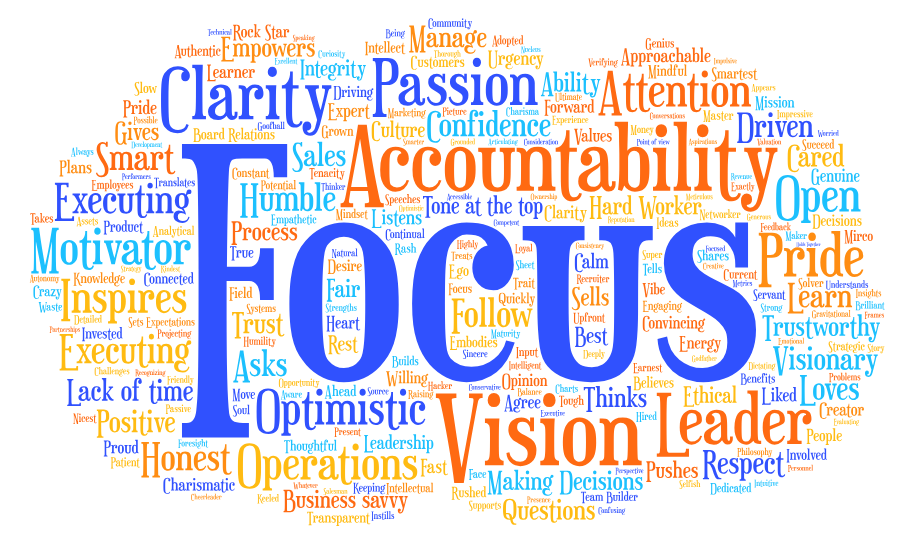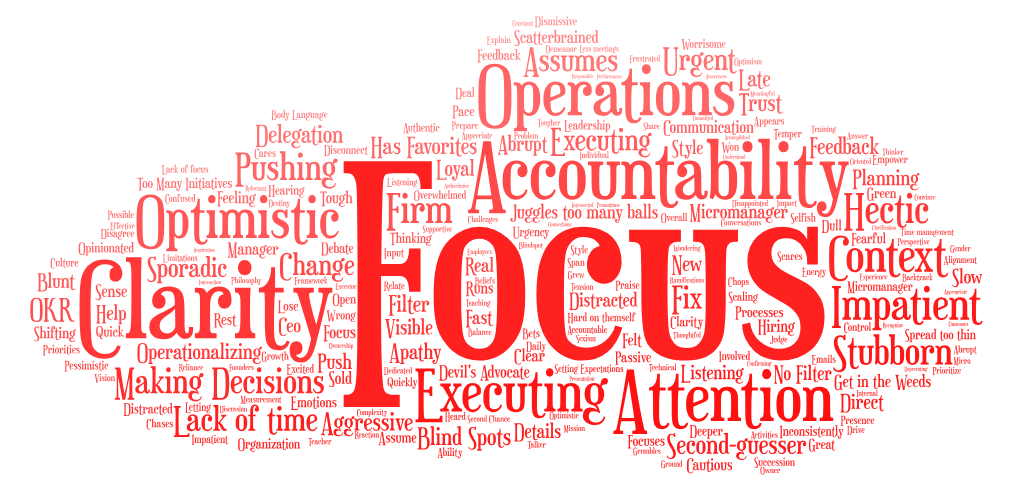When you think of the attributes of a CEO - what comes to mind? You might think of the visionary, introspective leader. Your mind might wander to a bad experience you had with a dictatorial CEO.
Before we work with any business, we interview a random sampling of employees to understand the trends of what’s working and what’s not. Part of the interviews involves asking employees about the CEO. We analyzed our transcripts (many written) of over 10,000 interviews over the past 20+ years to find the most common attributes used to describe CEOs. Here are the results:

Who wouldn’t want to work for someone that has all of those characteristics? Even at a quick glance, this looks like a good archetype for a CEO of almost any business.
Focus? Of course, the business needs focus. Accountability? Yes. Vision? A must.
However, we actually ask employees two separate questions about the CEO: “What are their strengths?” and “What are their weaknesses?”
The results get more interesting when you separate the two. Here are the results with only the positive comments:

This word cloud probably paints a different picture in your mind of a CEO. Vision, passion and humble become much more prominent. You’ll notice some of the larger words are missing, such as “focus” and “accountability.” More on that in just a second.
As we work with mostly rapid-growth companies, there’s a good reason why employees think they these are the strengths of their respective CEOs. In many cases, the CEO is one of the founders of the business. As a founder, you literally need a vision - something that didn’t exist before you created it.
If you created something - there’s a good chance that you were passionate enough about it to spend a lot of time creating and perfecting it. You also need to motivate and be a leader to people who don’t see the vision as clearly as the CEO.
The picture is very different when you highlight the weaknesses.
Here’s how the weaknesses were described:

For a vast majority of CEOs, these are their weakness. Did this surprise you? It actually surprised us at first. These all look like positives and crucial must-haves for any CEO, right?
Diving deep into the data, employees used phrases like, “Does not have focus,” “lacks clarity,” “short attention” to describe their CEO. Very few phrases were negative in the results by nature (Stubborn, Impatient, Slow, etc.)
You would think most of these attributes listed in the negatives would be necessary for a business to succeed. You’re right. However, the best CEOs know how to work within their limitations.
What do you do about your weaknesses? How do you overcome them?
There are really only 3 options with your weaknesses and actions to take:
- Ignore your weaknesses
- Focus on your weaknesses and try and turn them into a strength
- Find ways around your weaknesses
Ignore your weaknesses
Many simply ignore their weaknesses. They may not even be self-aware enough to realize what their weaknesses are. Others may simply choose not to acknowledge they exist and plow forward.
Everyone has strengths; everyone has weaknesses. You wouldn’t ignore your strengths - so why would you ignore your limitations? They exist, whether you like it or not.
Turn them into a strength
This is great when it works out, but it’s extremely hard to do. If you’re not hard-wired for focus, attention, and operations, it’s going to be an uphill battle. We believe it is true, “It’s really tough to put in what God left out.”
Find ways around your weaknesses
This is what the best CEOs do and where we spend the majority of our time coaching and working with scaling leaders and their companies.
The best leaders know their strengths and play to them. They also know their limitations and put people and a management operating system in place to account for their weaknesses.
How to make your weaknesses disappear - what the best CEOs do
There’s no such thing as a totally complete person; we all have strengths and we all have weaknesses. As a CEO, if your weaknesses are showing up in areas that need to be a strength to the business (like focus and operations), it’s more likely a sign that you haven’t surrounded yourself with the right people to complement your weaknesses.
The strengths and weaknesses of a CEO don’t make or break the business. Businesses are defined by the whole body of the team. A well-rounded team will far outperform one superstar CEO. However, it’s the CEO’s job to understand this relationship between their weaknesses and the team’s strengths.
The only way to be a “perfect CEO” is to build a well-rounded team around you.
The best CEOs hire others to balance out their weaknesses. If you are a vision-centric CEO with a ton of ideas, you need to surround yourself with other people in the C-Suite that are more operational and tactical and can bring your vision alive. When CEOs balance out the C-Suite, we hear a lot less about the weaknesses - they literally disappear in the interviews. The interviewees don’t mention nearly as many weaknesses when the CEO has accounted for their weaknesses.
The same is true if the CEO is more tactical and operational. While it’s rare, we’ve worked with CEOs that are extremely detail-oriented and focused on the operations side (Gene Austin, shares about how he is very operationally focused CEO on our podcast). They, too, have realized their strengths and hire others in the C-Suite to bring vision and energy into the company.
The Havard Business Review agrees. While there are several factors that are more likely to show up in high performing CEOs:
- They show a greater sense of purpose and mission, and demonstrate passion and urgency.
- They value substance and going straight to the core of the issue.
- They have a greater focus on the organization, outcomes and results, and others than on themselves.
No matter what your strengths or weaknesses are as a CEO, there are several things that all great CEOs have in common - being humble, open, and a For You Leader. For You Leaders are, as the name implies, for you. They see something in you that you may not see in yourself. They are committed to helping you reach your full potential. They are not against you. They are not for themselves. Read more about being a For You Leader and the three types of leadership.
We’ve developed proprietary tools we use with our portfolio of companies to coach and develop CEO’s to leverage their strengths and solve for their weaknesses. If you’re interested in learning about how we roll up our sleeves and can help you scale your business, contact us.

